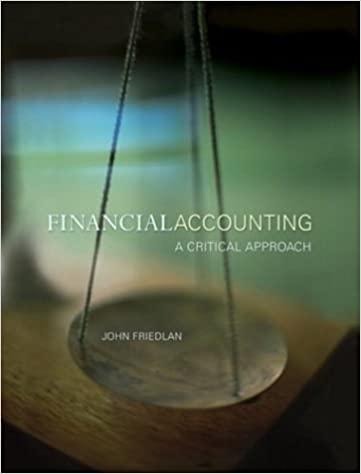(Applying accounting assumptions, qualitative characteristics, and measurement conventions, LO 2, 3, 4) Companies in the oil and...
Question:
(Applying accounting assumptions, qualitative characteristics, and measurement conventions, LO 2, 3, 4) Companies in the oil and gas exploration industry can choose the method they use to account for the cost of finding oil or gas. The cost of finding these resources is very expensive and significant amounts of money must be spent before a single drop of oil or gas finds its way to market.
The first method available to oil and gas exploration companies is the successful efforts method. When oil and gas companies explore, they often look in a number of places and find the resource only in some of the places. Thus a company may drill a dozen wells and find oil or gas in five of them. Under the successful efforts method of accounting, only the costs incurred to find wells that actually contain oil or gas are capitalized. The costs incurred to find wells that are empty are expensed once it is known that a well is empty. The capitalized costs are then amortized over the estimated amount of oil or gas that will be extracted from the well. (If a well is estimated to have 1,000,000 barrels of oil and the well cost $5,000,000 to find and develop, then
$5 is expensed for each barrel of oil that is removed from the well. If at the same time another $5,000,000 were spent on a well that proved to be empty, the $5,000,000 would be expensed immediately.)
The second method of accounting for the costs of exploring for oil and gas is called the full cost method. Under the full cost method all costs incurred to find oil or gas are capitalized regardless of whether the wells explored for are full or empty. All of the costs incurred would be amortized over the estimated amount of oil or gas that will be extracted from the well successful wells. (Thus, if a well is estimated to have 1,000,000 barrels of oil in it and that well and an unsuccessful well cost $10,000,000 to find and develop, then $10 is expensed for each barrel of oil that is removed from the successful well.)
Required:
a. Explain the effect on earnings that using the successful efforts method would have versus the full costing method. Which method do you think entities would prefer to use? Explain.
b. You have been asked to prepare a brief for the accounting standard setters that argues in favour of using successful efforts accounting for oil and gas exploration costs and against the full cost method. Use the accounting assumptions, qualitative characteristics, and measurement conventions identified in this chapter as appropriate to develop your arguments.
c. You have been asked to prepare a brief for the accounting standard setters that argues in favour of using full cost accounting for oil and gas exploration costs and against the successful efforts method. Use the accounting assumptions, qualitative characteristics, and measurement conventions identified in this chapter as appropriate to develop your arguments.
Step by Step Answer:






